MaryAnn Bernal's Blog, page 5
January 24, 2021
Book Spotlight: The Danish King’s Enemy (The Earls of Mercia) By MJ Porter
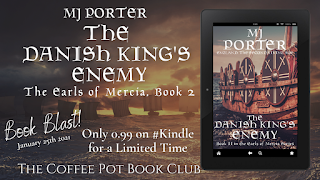
Every story has a beginning.
Leofwine has convinced his king to finally face his enemies in battle and won a great victory, but in the meantime, events have spiralled out of control elsewhere.
With the death of Olaf Tryggvason of Norway, England has lost an ally, and Leofwine has gained an enemy. And not just any enemy. Swein is the king of Denmark, and he has powerful resources at his fingertips.
In a unique position with the king, Leofwine is either honoured or disrespected. Yet, it is to Leofwine that the king turns to when an audacious attack is launched against the king’s mother and his children. But Leofwine’s successes only bring him more under the scrutiny of King Swein of Denmark, and his own enemies at the king’s court.
With an increase in Raider attacks, it is to Leofwine that the king turns once more. However, the king has grown impatient with his ealdorman, blaming him for Swein’s close scrutiny of the whole of England. Can Leofwine win another victory for his king, or does he risk losing all that he’s gained?
The Danish King’s Enemy is the second book in the epic Earls of Mercia series charting the last century of Early England, as seen through the eyes of Ealdorman Leofwine, the father of Earl Leofric, later the Earl of Mercia, and ally of Lady Elfrida, England’s first queen.
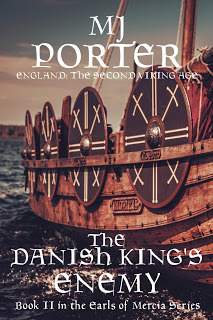
Buy Links
The Danish King’s Enemy is only 0.99 for a Limited Time Only
The Danish King’s Enemy is free to read with #KindleUnlimited subscription
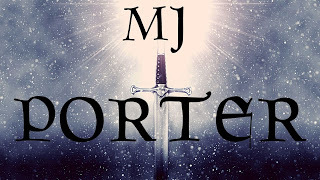
About M J Porter
I’m an author of fantasy (Viking age/dragon-themed) and historical fiction (Early English, Vikings and the British Isles as a whole before the Norman Conquest), born in the old Mercian kingdom at some point since AD1066.
I write A LOT. You’ve been warned!
Connect with the Author

January 21, 2021
The Inspiration Behind Falling Pomegranate Seeds: All Manner of Things, Book #2 By Wendy J. Dunn
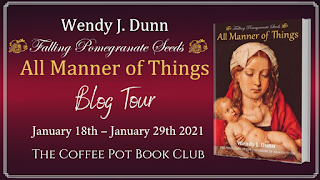
Winter, 1539
María de Salinas is dying.
Too ill to travel, she writes a letter to her daughter Katherine, the young duchess of Suffolk. A letter telling of her life: a life intertwined with her friend and cousin Catalina of Aragon, the youngest child of Isabel of Castile. It is a letter to help her daughter understand the choices she has made in her life, beginning from the time she keeps her vow to Catalina to share her life of exile in England.
Friendship, betrayal, hatred, forgiveness – All Manner of Things tells a story of how love wins out in the end.
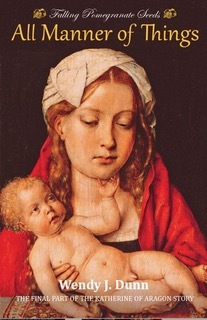
Praise for All Manner of Things.
“A timeless story of friendship and love, which will stay with the reader long after the last page is turned, All Manner of Things is Wendy J. Dunn's best novel yet…”
Lauren Chater, author of The Lace Weavers and Gulliver’s Wife.
“To read this book is like tasting a succulent pomegranate that swells and ripens and reveals the luscious fruit…”
Glenice Whitting, author Pickle to a Pie and What Time is it There?
“A sensitive and inspiring portrait of faith and friendship, framed around the devotion inspired by a remarkable queen. Wendy J. Dunn has written another gem of a novel for Tudor enthusiasts!”
Gareth Russell, author of Young and Damned and Fair: The Life of Catherine Howard, Fifth Wife of King Henry VIII (US title) (2017), The Darksome Bounds of a Failing World: The Sinking of the Titanic and the End of the Edwardian Era (2019).
“This is a story ripe with passion and rich in historical detail. All Manner of Things draws the reader deep into the heart of Henry's Tudor court, with its machinations, betrayals and very human stories of love and loss…”
Rachel Nightingale, author of The Tales of Tarya.
“A finely wrought tale that resurrects the indomitable spirit of Katherine of Aragon, breathing new life into her oft-told story... Yet another spellbinding novel from Wendy J Dunn!”
Adrienne Dillard, author of Cor Rotto and The Raven’s Widow.
"I'm so fussy about historical fiction, but Wendy J Dunn never fails to please. Dunn breathes life into Catalina and Maria in this celebration of true friendship. Their story seemed to reach through the ages to truly touch me. Beautiful, just beautiful"
Claire Ridgway, author of The Fall of Anne Boleyn: A Countdown.
“…this book made me fascinate over times long ago, times when ancient buildings were brand new, faded portraits were still sharp and striking and faith and loyalty were absolute; times when women had so little autonomy it was never an option for them to venture out on their own and just ditch this damn place.”
Angela Wauchop, Backstory Literary Journal.
¸.•*´¨)✯ ¸.•*¨) ✮ ( ¸.•´✶
Author Inspiration
What inspired Falling Pomegranate Seeds: All Manner of Things? What has inspired all my novels – history. To be more explicit – researching history. To be even more explicit – the history of women.
I was writing my first novel, Dear Heart, How Like You This? when I first became inspired to write a novel about Katherine of Aragon. Dear Heart told the story of Anne Boleyn through the point of view of the poet Sir Thomas Wyatt, the elder. It was also a novel that ended up deepening my knowledge about Katherine of Aragon. That was unavoidable. In her early years at court, Anne Boleyn was one of Katherine's attendants. Sir Thomas Wyatt also had a close connection to Katherine of Aragon. His artistic pursuits long benefited from her patronage.
Learning more about Katherine of Aragon also introduced me to María de Salinas. Katherine of Aragon's biography included mention of Maria's winter ride from London to be with the dying Katherine in 1536. I vividly saw her in my mind – a woman of about fifty (old in Tudor times), who did not waste time to ask for permission from Henry VIII (who likely would have refused her) to travel the long distance to Kimbolton Castle, on roads turned deadly dangerous by winter weather conditions.
By 1536, a written permit by the king was necessary to gain access to Katherine of Aragon. María lacked that. What she did not lack was her immense determination to be with her friend. She ended up falling from her horse a short distance from Kimbolton Castle. This worked in her favour because she stood outside the castle and demanded entry. She was a woman high up in Tudor society, the mother-in-law of the duke of Suffolk, so the people at the castle could not refuse to help her. But they would soon discover her true purpose. Once inside the castle, she headed straight to the chambers of Katherine of Aragon and remained with her until Katherine died in her arms.
History suggests María de Salinas was a kinswoman to Katherine of Aragon. But she is another woman from history we know little about. We know she was close to Katherine of Aragon, shared her early years in England, and served Katherine for years after her marriage to Henry VIII. So, María offered a perfect point of view character for my goal to tell the story of Katherine of Aragon.
I recreated the first part of Katherine’s story in Falling Pomegranate Seeds: The Duty of Daughters. When I first began that novel in 2002 (yes, that long ago!), I was using María de Salinas as my point of view character. Unfortunately, years after starting this work, I had to face the failure of my child’s point of view. For my story to work, I realised I needed to re-write it from the point of view of an adult. The failure of my first vision of my novel hurt –a lot. But I decided to lick my wounds by enrolling in a Masters in Writing, which led to a creative Ph.D. My creative artifact was The Light in the Labyrinth (2014), my second Anne Boleyn novel.
Of course, I never forgot my uncompleted work about Katherine of Aragon. I wanted to return to it. I always planned to return to it. But other writing projects kept distracting me. Then, one day, a publisher expressed interest in the concept of Falling Pomegranate Seeds: The Duty of Daughters. It pushed me to do that rewrite. Published in 2016, The Duty of Daughters committed me to finish my Katherine of Aragon’s story. Now I have.
Buy Links:
Amazon UK • Amazon US • Amazon CA • Amazon AU
About the Author
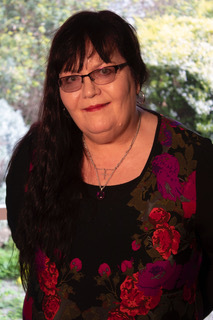
Wendy J. Dunn
Wendy J. Dunn is an Australian author, playwright and poet who has been obsessed with Anne Boleyn and Tudor History since she was ten-years-old. She is the author of three Tudor novels: Dear Heart, How Like You This?, the winner of the 2003 Glyph Fiction Award and 2004 runner up in the Eric Hoffer Award for Commercial Fiction, The Light in the Labyrinth, her first young adult novel, and Falling Pomegranate Seeds: The Duty of Daughters.
While she continues to have a very close and spooky relationship with Sir Thomas Wyatt, the elder, the serendipity of life now leaves her no longer wondering if she has been channeling Anne Boleyn and Sir Tom for years in her writing, but considering the possibility of ancestral memory. Her own family tree reveals the intriguing fact that her ancestors – possibly over three generations – had purchased land from both the Boleyn and Wyatt families to build up their own holdings. It seems very likely Wendy’s ancestors knew the Wyatts and Boleyns personally.
Connect with Wendy
Website • Facebook • Instagram • Twitter • Goodreads
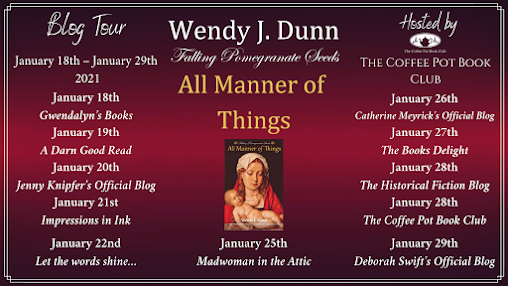
January 18, 2021
Book Spotlight and Excerpt: Historical Stories of Betrayal - Twelve tales of timeless challenges from post-Roman Britain to the present day.
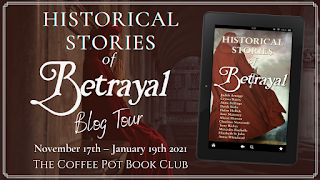
Betrayal, treachery, treason, deceit, perfidy—all names for the calculated violation of trust. And it’s been rife since humans trod the earth.
A promise broken
A mission betrayed
A lover’s desertion
A parent’s deception
An unwitting act of treason
Betrayal by comrades
Betrayal by friends
Could you resist the forces of misplaced loyalty, power hunger, emotional blackmail, or plain greed? Is there ever redemption, or will the destruction visit future generations and even alter history? These questions are still with us today.
Read twelve tales by twelve accomplished writers who explore these historical yet timeless challenges from post-Roman Britain to the present day.
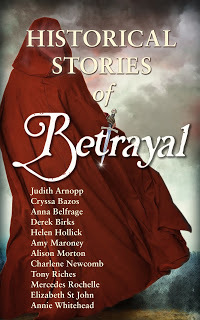
Excerpt
“Heart of a Falcon”
By Amy Maroney
The King of Cyprus invites young Frenchwoman Estelle to join his court. At her parents’ urging, she overcomes resistance to the idea and begins to imagine a glamorous new life. But when the true nature of her journey across the sea is revealed, Estelle realizes she has been the victim of a great deception—and must summon all her courage to survive.

Rhodes, Old Townvia Wikimedia By Norbert Nagel, Mörfelden-Walldorf, Germany
Rhodes, Greece
1457
Estelle crouched motionless in the shade. Her brother’s confident voice rang out, sailing over the lemon trees and drifting along the row of spiky rosemary shrubs where she had taken shelter.
“Sept, six, cinq, quatre…” he called.
An irrepressible giggle rose up from her small sister, who squatted nearby.
“Shh!” Estelle put a finger to her lips.
The little girl covered her mouth with both hands and squeezed her eyes shut.
“Trois, deux, un…”
The boy’s sandals were quiet on the courtyard’s hot stone floor. Perhaps he was creeping between the potted rose bushes now, brushing past the jewel-toned blooms that Estelle so loved. She had picked a handful of roses when they first moved into this home, seduced by their velvety crimson petals. And had been roundly scolded by her mother for it.
Had four years truly passed since those early days? Their lives in France seemed but a distant memory now. Still, not a week went by without her mother lamenting their move to Rhodes or talking about their eventual return to France.
Estelle dreamed about that day, too. Rhodes Town would never be home.
A shout. Her brother’s triumphant voice. A flurry of hushing, then silence.
Her sister began to sob.
Estelle wrapped an arm around the girl and rocked her gently. “It’s just a game, chérie.”
“Ah!” her brother roared, pouncing. Her sister shrieked in terror.
Estelle shook him off. “Stop it. She’s frightened.”
“Why?” he groused. “There’s nothing to be frightened of.”
“She can’t tell the difference between games and real life,” Estelle said.
A deep male voice broke into their argument.
“Estelle!”
She turned on her heel. Papa’s rangy form filled the interior doorway.
“Oui, Papa?”
“Some important news has come today. It concerns you.”
Estelle bent close to her sister, who with her golden curls was a miniature copy of their mother. “Look, a butterfly!”
The girl darted off in pursuit of the fluttering insect. Estelle gave her brother a pointed stare.
“I know, I know,” he grumbled, following in their small sister’s footsteps. “I’m in charge now.”
Hurrying to Papa’s side, Estelle took her father’s outstretched hand. She shut her eyes for a moment as they entered the dimly lit corridor, relying on his strong hand to guide her forward. When they stepped into Papa’s little study, her mother was already there, standing by the window with a fine vellum scroll in her hands. An elaborate blue wax seal hung from it.
“Such news, Estelle!” Maman exclaimed.
Papa took the scroll from her and began to read aloud.
His melodious voice cast its usual spell over Estelle. He spoke of a kingdom across the sea, of a princess, of a palace high in the hills on the island of Cyprus. She let the words wash over her, swaying a little, eyes half-closed.
“Estelle?” her mother snapped. “Are you listening?”
She blinked. “Forgive me, Maman. It’s a beautiful tale. Go on, Papa.”
“It’s no tale, my girl,” her father said gravely. “It is an invitation from a king. For you. You’ll be in the care of King Jean, a companion to his daughter Princess Charlotte, and tutor to her child. Fortune has been kind.”
“More kind than you deserve.” Her mother’s face took on a familiar expression of pained disapproval.
“I don’t understand,” Estelle said.
“A king has summoned you to his court,” her mother said in the tone she normally reserved for babies and deaf elders. “Where is your gratitude?”
Estelle looked at her parents in bewilderment. “But how does he know of me?”
“Thanks to Michel Pelestrine,” Papa said.
She remembered the young man. Michel Pelestrine, a falconer like her father, had followed her family out of France shortly after they arrived in Rhodes. He’d lodged with them in Rhodes Town on his way to the kingdom of Cyprus.
“King Jean prefers to be surrounded by French courtiers like Monsieur Pelestrine, to keep the old ways alive,” Papa explained. “But fewer and fewer come to Cyprus from France these days. Now that his daughter the princess is expecting her first baby, the king must make provisions for the child’s education, with a proper French tutor. Monsieur Pelestrine suggested you for the position.”
Estelle felt as if a stone had lodged in her throat. “The King of Cyprus wants me to teach his grandchild?”
“Who better than you?” her mother said. “You taught French to that Italian girl, the artist’s daughter. You teach it to your brothers and sisters now. I don’t know why you haven’t made more headway with the servants, though.”
“And you write more beautifully than any scribe,” her father interjected, throwing an irritated glance at her mother. “You’ll make a fine tutor.”
“When will we leave, Papa?” Estelle asked.
He hesitated. The muscles in his jaw worked under his closely trimmed dark beard. “I can’t leave the island while I’m in the employ of the knights, but you’ll not be alone. We’ll put you under the care of a trustworthy chaperone. There’s sure to be a few respectable women sailing to Cyprus on the next fleet. Your mother will look into the matter.”
“It will be easy to find someone of quality to see you safely there,” her mother asserted. “I’ll make inquiries at church. Merchants and their wives travel between Rhodes and Cyprus often, I hear.”
“How far away is Cyprus?” Estelle asked.
“With the right winds, the journey takes just a few days,” Papa said. “It’s spring now and the winter gales are over. No better time to sail.”
Estelle’s throat grew dry. Her left knee began to tremble.
“I thought we were returning to France soon,” she protested.
“We cannot think about returning home yet,” her father said. “We’ll stay as long as the Grand Master needs me. One day, if God is willing, we shall all voyage to France together.”
“Where is your gratitude? The King of Cyprus will pay us in gold for this arrangement,” Maman said to Estelle. “The entire family will benefit. We need that money.”
“Sophie!” Papa’s voice hardened. “She understands nothing of our money troubles. Nor should she.”
“Why not?” Maman shot back. “We can’t live the way we used to, not anymore.”
“I have never lived beyond our means.” He fixed Maman with a stern look.
“It’s not my fault I grew up with money. There are things I find necessary to survive life on this sun-baked island. You may think them luxuries, but you’re a man.”
Estelle’s mind went to the colorful silks her mother often purchased at the market. To the brimming sacks of saffron, pepper, and ginger that frequently appeared in the kitchen. To the fragrant, lavender-flecked soaps Maman preferred.
“Besides, there will be no more funds from Toulouse, not since Papa—” her mother’s eyes welled with tears. She took a shaky breath and gathered her composure again. “You’d think a master falconer would be paid more generously.”
“That’s enough, Sophie,” Papa warned.
“Not only will you be helping your family,” Maman said, turning to Estelle, “but this is the greatest honor you shall ever know. Such an opportunity only comes but once, does it not?”
“Yes, Maman,” Estelle managed to choke out.
Papa’s brown eyes grew thoughtful. He stepped closer to Estelle, cupped her cheek with his hand. “I’ll want you to finish up those notes of mine. The German bookmaker we met at church this winter told me he can bind them together with an oiled leather cover. A book of advice and healing remedies—that shall be my gift to Michel Pelestrine, hand-carried by you across the sea.”
Maman beckoned to Estelle. “Come. Let’s see what there is to send along with you. Perhaps I’ll give you a pair of my finest silk sleeves, a velvet bodice, or two. And satin shoes. Yes, a few items in the latest French fashion, fit for a royal court.”
Papa bent down and kissed Estelle on the forehead. The familiar gesture gave her a measure of comfort, as always.
“Go on now, ma petite chérie,” he murmured. “I’ve work to do.”
She dragged her feet, somehow forced herself to move to the door. It was as if all the air had been sucked from her lungs.
I cannot leave you, Papa. I cannot leave my brothers and sister.
In her mind, the words exploded like a cannon shot. She could hear the booms, could see each letter launching over the sparkling sea toward France.
Tears burned at her eyelids, but she blinked them away.
No tears, she promised herself. No tears until I set sail, and only then when no one can see me.
Buy Link
About the Authors
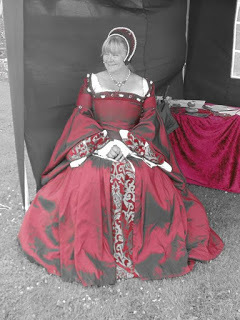
Judith Arnopp
A lifelong history enthusiast, Judith Arnopp holds an honours degree in English/Creative writing, and a Masters in Medieval Studies. Judith has written twelve novels to date, nine of which are based in the Tudor period covering women like Elizabeth of York, Anne Boleyn, and Mary Tudor, but her main focus is on the perspective of historical women from all roles of life. The Beaufort Chronicle: The Life of Lady Margaret Beaufort (three-book series) covers the transitional period between Bosworth and the death of Henry Tudor. She is currently taking a break from Tudor women and writing from the perspective of Henry VIII in "A Matter of Conscience."
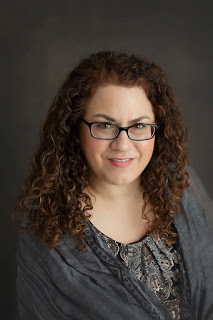
Cryssa Bazos
Cryssa Bazos is an award-winning historical fiction author and a seventeenth-century enthusiast. Her debut novel, Traitor's Knot is the Medalist winner of the 2017 New Apple Award for Historical Fiction and a finalist for the 2018 EPIC eBook Awards for Historical Romance. Her second novel, Severed Knot, is a B.R.A.G Medallion Honoree and a finalist for the 2019 Chaucer Award.
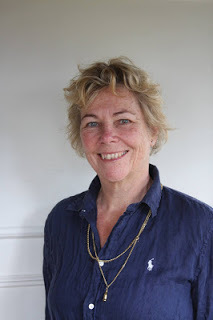
Anna Belfrage
Anna Belfrage wanted to become a time-traveller but ended up as a financial professional with a passion for writing and history. She has authored the acclaimed time travel series The Graham Saga, set in the 17th century, and the equally acclaimed medieval series The King's Greatest Enemy, set in 14th century England. Anna has also published The Wanderer, a contemporary romantic suspense trilogy with paranormal ingredients. Her latest release, His Castilian Hawk, is a story of loyalty and love set against the complications of Edward I's invasion of Wales.

Derek Birks
Derek Birks lives in Dorset, England, though he spent his teenage years in Auckland, New Zealand, where he still has strong family ties. For many years he taught history in a large secondary school before turning his hand to writing historical fiction. His stories, set both in the medieval period and late antiquity, are fast-paced and action-packed—almost no character is safe. He has also produced a series of non-fiction podcasts on the War of the Roses. When he is not writing, he enjoys travel, walking, and watching films.
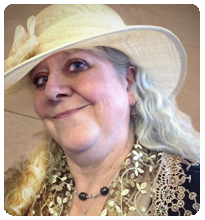
Helen Hollick
First published in 1994, Helen Hollick became a USA Today Bestseller with her historical novel, The Forever Queen (titled A Hollow Crownin the UK), with the sequel, Harold the King (U.S: I Am the Chosen King), being novels that explore events that led to the Battle of Hastings in 1066. Her Pendragon's Banner Trilogy is a fifth-century version of the Arthurian legend, and she writes a nautical adventure series, The Sea Witch Voyages. Her non-fiction books are Pirates: Truth and Tales, and Life of a Smuggler. She lives in an eighteenth-century farmhouse in North Devon, runs Discovering Diamonds, a review blog for historical fiction, and occasionally gets time to write.

Amy Maroney
Amy Maroney lives in Oregon, U.S.A, with her family. She spent many years as a writer and editor of nonfiction before turning her hand to historical fiction. When she's not diving down research rabbit holes, she enjoys hiking, drawing, dancing, traveling, and reading. Amy is the author of the Miramonde Series, a trilogy about a Renaissance-era female artist and the modern-day scholar on her trail.
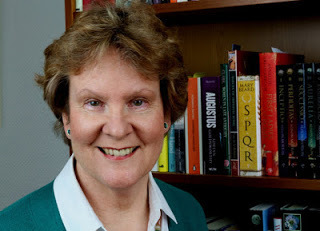
Alison Morton
Alison Morton writes the award-winning Roma Nova series featuring modern Praetorian heroines—tough but compassionate women. She puts this down to her deep love of Roman history, six years' military service, a Masters in History, and an over-vivid imagination. It was hot that afternoon when staring at a particularly beautiful mosaic, she started wondering what a modern Roman society would be like if run by strong women. Now, Alison blogs, reads, cultivates a Roman herb garden, and drinks wine in France with her husband.
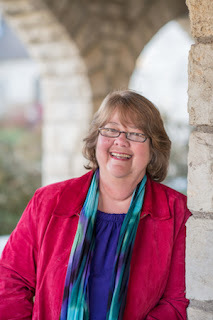
Charlene Newcomb
Charlene Newcomb lives, works, and writes in Kansas. She is an academic librarian (retired) by trade, a U.S Navy veteran, and has three grown children. When not at the library, she is still surrounded by books trying to fill her head with all things medieval and galaxies far, far away. She loves to travel and enjoys quiet places in the mountains or on rocky coasts. But even in Kansas, she can let her imagination soar.

Tony Riches
Tony Riches is a full-time author based in Pembrokeshire, Wales, UK, and is best known for his Tudor trilogy. After a career in the Royal Air Force, he held senior roles in the National Health Service and Local Government. When researching his books Tony likes visiting the actual locations and discovering elusive primary sources. In his spare time, he enjoys sailing and sea kayaking.
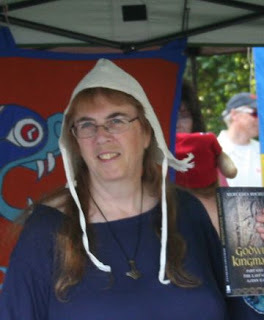
Mercedes Rochelle
Mercedes Rochelle is an ardent lover of medieval history and has channeled this interest into fiction writing. Born in St. Louis, Missouri, she received her B.A in Literature at the University of Missouri before moving to New York to "see the world". The search hasn't ended. Today she lives in Sergeantsville, N.J with her husband in a log home they had built themselves.

Elizabeth St. John
Elizabeth St. John spends her time between California, England, and the past. An acclaimed author, historian, and genealogist, she has tracked down family papers and residences from Lydiard Park and Nottingham Castle to Richmond Palace and the Tower of London to inspire her novels. Although the family sold a few country homes along the way (it's hard to keep a good castle going these days), Elizabeth's family still occupy them—in the form of portraits, memoirs, and gardens that carry their legacy. And the occasional ghost. But that's a different story . . .

Annie Whitehead
Annie Whitehead has written three award-winning novels set in Anglo-Saxon England:To Be A Queen, about the life of Æthelflaed, Lady of the Mercians; Alvar the Kingmaker set in the turbulent tenth century when kings died young and not always of natural causes, and Cometh the Hour, the story of King Penda the pagan king. Her nonfiction books are published by Amberley Books and Pen & Sword Books and she was the inaugural winner of the Historical Writers' Association/Dorothy Dunnett Society Short Story Award.
Social Media Links:
Historical Fictioneers
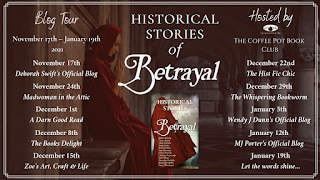
January 17, 2021
Interview with David Fitz-Gerald, author of She Sees Ghosts - The Story of a Woman Who Rescues Lost Souls

A blazing fire killed her family and devoured her home. A vengeful demon haunted her. Ghosts of the Revolutionary War needed help that only she could provide. A young woman languished, desperate to survive, and teetered on the edge of sanity.
Mehitable grew up in a freshly tamed town, carved from the primeval forest. Family, friends, and working at the mercantile filled her days and warmed her heart. For Mehitable, life was simple and safe, until tragedy struck. When her family perished in their burning home, she retreated into a world of her own making.
As a young girl, she had seen glimmers, glimpses, and flickers of the spirit world. She closed her eyes. She turned her back. She ignored the apparitions that she never spoke of, desperately hoping they would leave her in peace. She was mistaken.
Grief-stricken, Mehitable withdrew from the human world. Ghosts were everywhere. They became bolder. She could no longer turn her back on the spirit world. Her friends feared for her survival. Nobody understood her. She would have to find her own way.
Fans of TV’s Ghost Whisperer and Long Island Medium will especially love She Sees Ghosts. This historical novel features memorable characters and delivers bone-tingling, spine chilling goosebumps. It stands on its own and it is the next installment in the Adirondack Spirit Series by the award-winning author of Wanders Far―An Unlikely Hero’s Journey. David Fitz-Gerald delivers a historical novel with a bittersweet ending that you won’t see coming.
Would she save the spirits’ souls, or would they save her? Only time would tell.
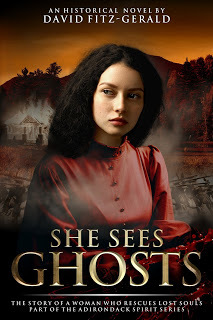
Interviewing David Fitz-Gerald
What literary pilgrimages have you gone on?
What a fun question. One of my favorite locations to write about is also one of my favorite places to visit. It is an undeveloped 100-acre lake in the Adirondacks of New York State, near Lake Placid. It is called Copperas Pond. It requires a short hike, and it’s well worth the trip.

Copperas Pond
What is the first book that made you cry?
I wish I could remember. I’m sure it was a horse book, and there’s a good chance it was Thunderhead by Mary O’Hara.
What are common traps for aspiring writers?
If this aspiring writer is any indication, perhaps it is going into too much detail about things I care about but that most people would not. For example, sometimes I go into too much detail about how things are made when a reader might just want a little taste of that.
What is your writing Kryptonite?
Commas. My cousin, who is my editor, must think I’m untrainable when it comes to commas. Perhaps if she keeps at it, she will get somewhere with me.
What other authors are you friends with, and how do they help you become a better writer?
I’m finding that indie authors are very supportive. I’m pretty new at this, but I’ve had a chance to interact with a growing number of other authors. It’s great sharing triumphs and tribulations and helping each other by providing feedback. In the case of She Sees Ghosts, Elizabeth Bell, author of the Lazare Family Saga, made several observations that made my book better. One point I most appreciated was not to lose track of the cat in the book. Author Paul Bennett lent me a character from his series, The Mallory Saga, for a crossover appearance in my book. It was fun to do, and I think it fits the story perfectly.
If you could tell your younger writing self anything, what would it be?
Maybe I would tell my younger writing self not to major in accounting. However, maybe I was not meant to write as a youngster.
What was the best money you ever spent as a writer?
The experience of participating in blog tours is so wonderful, I’d easily say that’s the best money I’ve spent as a writer.
What was an early experience where you learned that language had power?
I think it might be when I read Bury My Heart at Wounded Knee by Dee Brown. I remember reading it as a kid when we were on a camping vacation while I had poison ivy. You can tell that language has power over you when it sticks to you for fifty years.
What’s your favorite under-appreciated novel?
I recently read a great book by Eileen Charbonneau called Seven Aprils. I think it should be a best-seller.
What do you owe the real people upon whom you base your characters?
Clearly, I owe my grandfather a lot. My first book was about the business he built in the 1960s. After writing that book, I was hooked, and I continued writing. She Sees Ghosts is my third book, and it is at least somewhat inspired by a visit my grandfather paid me after his passing. Although I didn’t appreciate it at the time, thank you for visiting me that night, Grandpa.
What does literary success look like to you?
Anytime someone tells me something specific that they like about my book, that’s what success feels like to me. Recently, someone told me that I was her favorite author, and I was blown away. And the sense of satisfaction when a book is finished and ready to share with readers is worth all the time and effort that goes into creating it.
What kind of research do you do, and how long do you spend researching before beginning a book?
I like going to the locations I write about, visiting museums, and reading books. I’ve also found tremendously useful information in old newspapers and on Ancestry.com. I love old postcards, and many of them have inspired scenes in my books. In the case of She Sees Ghosts, I also binge-watched Ghost Whisperer and Long Island Medium episodes. I think the amount of research required before writing a book varies. I find that as I’m writing, I discover I need to do more research along the way.
What are the ethics of writing about historical figures?
I think this is a very important question. Most of my historical characters are fictional. I try not to drift far from the facts or take creative license with the characters who lived real lives. She Sees Ghosts is set far enough in the past that I feel a little more comfortable fictionalizing them than I felt when I wrote my first book, which was set in the 1960s and early 1970s. I was cautious, knowing that I was writing about living people, their parents, and grandparents.
Do you read your book reviews? How do you deal with bad or good ones?
I read every book review. The positive reviews keep me writing. Critical reviews tell me a lot about what needs improvement and can help me write better in the future. On the other hand, not every book is for every reader, and sometimes a critical review reflects that. All that said, a harsh review sure can ruin my day.
What was your hardest scene to write?
Chapter 19. I shouldn’t say too much about this chapter since it occurs three-quarters of the way into the book, and I don’t want to spoil it, but maybe I could say a little something about it. I think readers will be surprised to find a romantic storyline at this point in this book and be surprised by our protagonist in this situation. I always had this scene in mind for this point in the story, yet for some reason, it was the hardest one for me to write. I’m grateful for my collaborator’s suggestions, and I love the way it turned out. Aside from advancing the plotline, I think it adds a welcome respite from the ghostly elements in the rest of the book.
What one thing would you give up to become a better writer?
Leisure time. Oh wait, I already did that! I can’t think of a more rewarding hobby than to spend all my free time writing, so I guess that’s my answer.
What is the most difficult part of your artistic process?
Helping my stories find the people who will love them is the most difficult challenge. It could be because my books don’t fit solidly in one genre and aren’t immediately comparable to other titles. If you know of other books that are similar to mine, please let me know. You can reach me at dave@itsoag.com.
If you had to do something different as a child or teenager to become a better writer as an adult, what would you do?
Strangely, I am finding 8th grade English very helpful as a “home school teacher.” It turns out these lessons are valuable in real life. I wish I had paid more attention to grammar lessons in school.
How long on average does it take you to write a book?
So far, about one year, but I’m getting faster. I’ve noticed that some stories are more challenging to write than others, and it also depends on how much research is necessary.
Do you believe in writer’s block? If not, why? If so, why?
I do believe in writer’s block, having experienced it. Fortunately, I’ve been able to write around the block, and my collaborator has been able to help me when I’ve gotten stuck. Most of my blocks have been attributable to trying to force something into a story that doesn’t belong. Once I figure out why it doesn’t fit, I’m usually able to conquer the block. Sometimes the scene gets cut from the story.
Buy Links:
¸.•*´¨)✯ ¸.•*¨) ✮ ( ¸.•´✶
About the Author

David Fitz-Gerald
David Fitz-Gerald writes fiction that is grounded in history and soars with the spirits. Dave enjoys getting lost in the settings he imagines and spending time with the characters he creates. Writing historical fiction is like making paintings of the past. He loves to weave fact and fiction together, stirring in action, adventure, romance, and a heavy dose of the supernatural with the hope of transporting the reader to another time and place. He is an Adirondack 46-er, which means that he has hiked all of the highest peaks in New York State, so it should not be surprising when Dave attempts to glorify hikers as swashbuckling superheroes in his writing. She Sees Ghosts―A Story of a Woman Who Rescues Lost Soulsis the next installment in the Adirondack Spirit Series.
Connect with David
Website • Twitter • Facebook • Instagram

January 11, 2021
Book Spotlight and Excerpt: Restitution By Janet Lee Berg
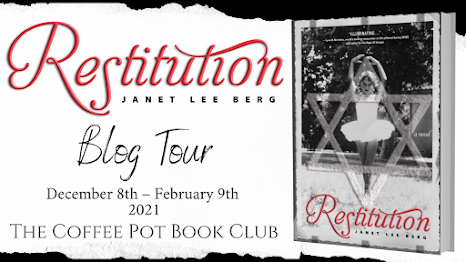
“Restitution” is the riveting, multigenerational story of Sylvie Rosenberg, a Holocaust survivor traumatized by the memory of her art dealer father forced to trade paintings with the Nazis in an attempt to save their large extended family. Sylvie’s adult life in 1970s New York is plagued by survivors’ guilt and bitterness. But when her self-destructive ways threaten to upend the life of her Vietnam-vet son, Sylvie finally needs to face her demons. She returns to Holland to confront her past and fight the Dutch judicial system for the return of the masterpieces, but the battle proves far more difficult than Sylvie imagined...
Weaving in tragic true events from her own family history, Berg offers a sensitive story of history, romance, and humor along with detail from the extensive research of Lynn H. Nicholas, the world’s leading expert on art pilfered during WWII. Over 80 years later, the real family still awaits justice and the return of artwork that continues to hang on museum walls, without noting their tragic history…
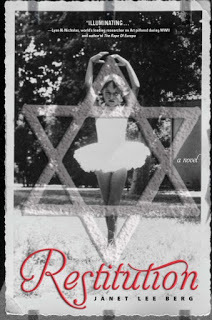
Excerpt
Sylvie was disturbed when they stood in front of a boat scene battling rough waters; the artist captured pure fear on the faces of those aboard ship. She played a moment over again in her own head, gagging from the stench of fish on the boat she had escaped on.“Are you all right?” He reached for her elbow but withdrew his hand.
“Yes,” she said, instantly shaking off the mental image as she searched the depths of his eyes. “I’m fine.”
“I can see you really study the artist’s interpretation. Are you an artist? A professor of art?”
“Me? No, I’m just a lover of art.”
“I am, too,” he said. “I’m not nearly as knowledgeable as you. Sometimes I join the guided tours, sometimes I bring my own books on the subject. I come here every Friday, yearning to learn more.”
“If you have such a strong passion for something, you will get what you want from it.” She didn’t tell him she was thinking of when she was a kid, studying books on art to impress her father.
“Well, perhaps we will meet again in this very spot.” He looked into her eyes, turned away, and they went off in different directions.
“Perhaps,” she said to the empty air.
On the way home, she felt a skip in her step, like she was sixteen again. A few days had passed. Sylvie looked at the calendar. Michael would be coming home soon. She felt anxious, ready to do something. Anything but shopping, she thought, now that she was actually trying to save money. Saving was never a part of her vocabulary until she came so close to losing the kids forever. She had to think of them first, and soon, she would have enough money to pay back what she had taken from the envelope under their mattress.
She couldn’t shake that man at the museum out of her head. She wondered if her friend Cynthia was right about having romantic feelings again in her lifetime. Seemed impossible. She almost picked up the phone to call her, but she knew if she did, Cynthia would ask a million questions. Sylvie hadn’t even asked him his name. And what did he say? He goes to the museum every week? What day of the week? Did he mention what day of the week?
She paced her living room thinking about him, trying to talk herself out of such foolishness. Then she remembered, heard his voice in her head. “I come here every Friday, yearning to learn more . . .”
“Oh my God, it’s Friday. Today is Friday.” She took a quick shower, reached inside her closet, and grabbed the first skirt and a sheer ivory blouse that complimented her complexion. For a split second, she realized that it didn’t matter what she wore—not to someone like him, whatever his name was. He was really looking at me that day, not at what I wore. And he listened to me talking about the art, as if he respected me.
Even stranger than that—Sylvie heard him, too. She was actually listening, and that was something she was never proficient at— whether a result of her hearing loss or not. There must have been a reason she was tuned in to this stranger.
Sylvie craned her neck, searching for him. She tried to recall specifics about his appearance that day, mostly recalling his chiseled profile. There was that moment, though; they seemed to stare into each other’s eyes. She shivered, started to panic that she would never find him again. She looked hard at a man about his height, also with salt-and-pepper hair.
“I thought you were someone else,” she said.
“People say that all the time,” he laughed. He looked her up and down, and it gave her the creeps. After a couple of hours passed, she was almost ready to give up and leave the museum; then she stopped in front of a sensual-looking painting by Peter Paul Rubens called The Union of Earth and Water. She sighed.
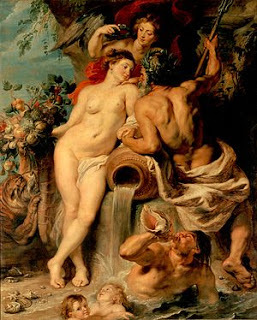
The Union of Earth and Water - Pieter Paul Rubens
Was that her father’s breath again at the back of her neck? “Do you think they’re lovers?” A man’s voice startled her.
Sylvie jumped. “It’s you.”
“Sorry.”
She was right about his eyes. They were deep and sensitive.
“What did you ask?” She felt a wide smile about to cross her lips but held back, not wanting to appear too anxious. “Do I think they’re lovers? Hmm, being such a romantic, I believe they are, yes.” Cynthia should hear me, she thought. “Do you? Think they’re lovers?”
“Not a doubt in my mind. I’ve studied this work before—her gentle curves, her pale white figure connected to his darker figure.”
“Yes,” Sylvie said. “Do you see the way Cybele looks at Neptune, the god of the sea? Her posture is so relaxed. She looks at him as if nothing in the world matters but him. I love the swirling composition and placement of the flowers and fruits, the way the cloth drapes across their nakedness. Rubens idolized the Venetian artists—it shows in his work.”
Sylvie realized she was talking too much and abruptly stopped to study his face as if it were another canvas hanging on the museum walls. She watched his lips moving and imagined what it would feel like to have them lingering over hers.
Buy Links
Amazon UK • Amazon US • Barnes and Noble • Books-a-Million

Janet Lee Berg
Janet Lee Bergis a native New Yorker with a residence in Charleston, SC. She is also author of several other works of fiction and children’s books and has had her work featured in the local, regional, and national press. A journalist in the Hamptons, Janet Lee Berg has interviewed numerous celebrities and pursued an MFA in Creative Writing, under the direction of published professors including Frank McCourt, author of Angela’s Ashes.
Connect with Janet
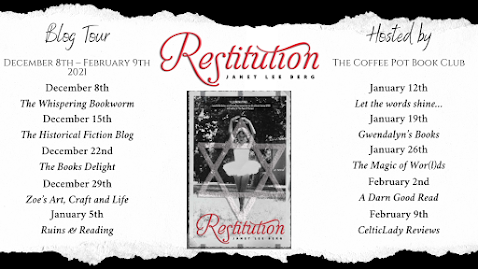
January 7, 2021
The Inspiration behind A Painter in Penang (Penang Series, Book 3) By Clare Flynn
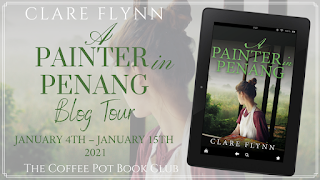
An Author's InspirationA Painter in PenangClare Flynn
How a day’s excursion led to three best-selling novels.
The inspiration for my latest novel A Painter in Penang, like most of my books, starts with location.
In 2019 I went on a four-month round-the-world cruise. I started out assuming I would write during the voyage. I’d just delivered a manuscript to my publisher and had started to write a sequel but couldn’t focus and had, for the first time after nine novels, no desire to hammer away at my laptop. I decided to give myself a break and just do lots of reading and enjoy the places I was visiting. Fellow passengers who knew I was a writer would ask me whether the fascinating places we were seeing were inspiring me. While I loved so many of them, alas, I still had no urge to write.
About three months into the cruise we visited Singapore and Malaysia. I’d been to Singapore twice before and hadn’t particularly liked it, but this time it was different and I really loved the place with its mixture of soaring new architectural wonders, the quaintness of Chinatown and Little India, the pleasures of the botanical gardens, and the Singapore Slings at Raffles. Stopping then in Selangor to visit a guest house in the countryside and a sultan’s palace, the weather changed from torrential rain to blistering sunshine and back again. I became fascinated by this country where sadly much of the native jungle, once home to orangutans, is now endless spreads of palm oil plantations. I was interested in its odd political structure – a federation of royal states and one of the few remaining elective monarchies in the world – the sultans choose the King of Malaysia from among themselves by vote.

Buddist Temple Penang
A day later we arrived at Penang where I did a brief tour of the island and visited some temples in beautiful George Town, now a UNESCO world heritage site. There was something about the place – indeed Malaysia as a whole, that kept me thinking about it – even though I was still not writing. I loved the colourful Buddhist and Daoist temples, the lush green of the island, the clear blue sea of the straits, and the distant hills of Kedah. As we sailed away, I wished I’d had longer to spend there.

George Town
On we voyaged to Thailand, India, and the Middle East, and it was only as we entered the Mediterranean on the home leg to England that I got a sudden urge to write. And that urge was to write about Penang. That first book, in what has turned into a series of three, was well underway by the time we docked in England. I had found my characters and – like many of my books, I’d decided to set it in a time that fascinates me – the dying days of the British empire and among the British expats who were living the self-indulgent lives of lotus eaters. I began researching life in Penang in the 30s and up to the invasion of the Japanese horrified at the way the British community and the government there blindly refused to acknowledge the Japanese threat – partying on in the sunshine as the enemy drew closer and as the rest of Britain back home were facing up to the blitzkrieg and the constraints of rationing. The Pearl of Penang – is the story of Evie who takes a wild chance on her future by travelling to Penang to marry a man she barely knows.
Soon after, Prisoner from Penang followed – this time the story of Evie’s friend Mary, captured and interned by the Japanese in Sumatra after the Fall of Singapore. By now, my readers were telling me they loved the island locations, the dramatic wartime events and the characters. Writing a third book was the obvious conclusion.
It is a surprise that such a brief visit to a small island should spark three books. But there is something about Penang that truly captured my imagination. It is beautiful, sitting just a short distance off the coast of the Malay peninsula. Nowadays it’s been heavily developed with high rise hotels and apartments, but it still retains a tropical island magic. First of all, there is George Town with its fascinating colonial buildings, its Chinese shop-houses, and brightly painted temples. The island offers views across to the peaks of Kedah from the mountainous centre, Penang Hill, which has a funicular railway and spectacular views at the top. Many of the buildings and places mentioned in A Painter in Penang are unchanged – although the view now includes the Chinese-funded road bridge over the straits to the peninsula as well as numerous skyscrapers, built on reclaimed land.

Penang Vegetation
The historical inspiration for A Painter in Penang came from my growing awareness of what happened in Malaysia (still then known as Malaya) after the war. The Malayan Emergency was a civil war in all but name and claimed around ten thousand lives on all sides including the civilian population.
Nowadays little is remembered of this conflict which in many ways was a precursor to the Vietnam War and offered lessons which were sadly ignored. What was a civil war in all but name lasted twelve years, ending in 1960. The first significant step in the long and bloody struggle was the killing of three British rubber planters on the morning of 16th June 1948.
I decided A Painter in Penang would be set against the backdrop of the first six months of the Emergency in 1948. As I wanted each book in the series to be able to stand alone, I needed a new main character (although Evie of The Pearl of Penang and Mary of Prisoner from Penang do feature). My new heroine is Jasmine Barrington, Evie’s sixteen-year-old stepdaughter who is staying for an extended period with Evie’s friend Mary and her husband on their rubber plantation on Penang.
A Painter in Penang is also inspired by own interest in painting. I had once before had a main character who paints (Ginnie in Kurinji Flowers) but this time I wanted the love of art to be the most significant driver in Jasmine’s life. It was interesting to think about the process of painting and how to bring that alive on the page. And what an inspiring place to paint.
I didn’t set out to write about this part of the world and certainly did not envisage becoming so fascinated by the history of the Malayan Emergency. Nor did I expect a brief visit to Penang to spark my imagination enough to inspire three books. I intended to go back to the island while writing The Pearl of Penang but couldn’t make the timings work. I would have loved to do so while writing A Painter in Penang – but this was my Lockdown book so that was out of the question. I had to settle for going back in my imagination. Penang was my escape from Covid-19 and the four walls of my home. I suspect the success of the books is partly down to the fact that many readers are also looking for vicarious travel adventures. I hope I may have tempted you to join them.
***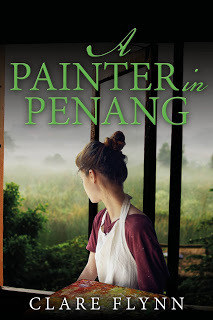
Sixteen-year-old Jasmine Barrington hates everything about living in Kenya and longs to return to the island of Penang in British colonial Malaya where she was born. Expulsion from her Nairobi convent school offers a welcome escape – the chance to stay with her parents’ friends, Mary and Reggie Hyde-Underwood on their Penang rubber estate.
But this is 1948 and communist insurgents are embarking on a reign of terror in what becomes the Malayan Emergency. Jasmine goes through testing experiences – confronting heartache, a shocking past secret, and danger. Throughout it all, the one constant in her life is her passion for painting.
From the international best-selling and award-winning author of The Pearl of Penang, this is a dramatic coming of age story, set against the backdrop of a tropical paradise torn apart by civil war.
Purchase Links:
***
 Clare Flynn
Clare FlynnAbout the Author
Clare Flynn is the author of twelve historical novels and a collection of short stories. A former International Marketing Director and strategic management consultant, she is now a full-time writer.Having lived and worked in London, Paris, Brussels, Milan, and Sydney, home is now on the coast, in Sussex, England, where she can watch the sea from her windows. An avid traveller, her books are often set in exotic locations. Clare is a Fellow of the Royal Society of Arts, a member of The Society of Authors, Novelists Inc (NINC), ALLi, the Historical Novel Society and the Romantic Novelists Association, where she serves on the committee as the Member Services Officer. When not writing, she loves to read, quilt, paint, and play the piano. She continues to travel as widely and as far as possible all over the world.
Connect with Clare:
Website • Blog • Facebook • Instagram • Twitter
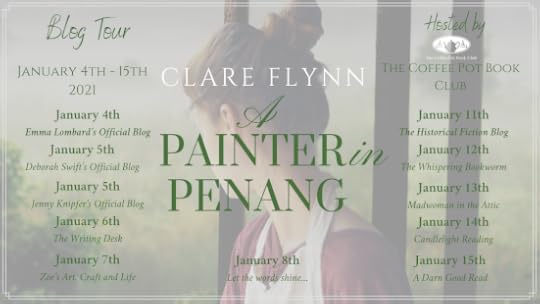
January 6, 2021
Book Spotlight and Excerpt: A Rooster for Asklepios by Christopher D. Stanley
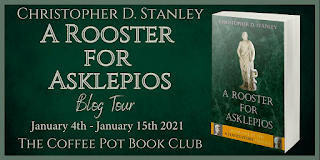
Marcus, a slave in the household of Lucius Coelius Felix, enjoys a better life than most slaves (and many free citizens) as the secretary and accountant of a wealthy aristocrat. His master is rising in the civic life of the Roman colony of Antioch-near-Pisidia (central Turkey), and his responsibilities and income are growing as well. If this continues, he could soon earn enough to buy his freedom, set up a small business, and even marry.
Then misfortune strikes, and his master falls into a deep depression that is exacerbated by a nagging illness that his physician is unable to cure. The future looks bleak until the physician receives a dream from the healing god Asklepios calling Lucius to travel hundreds of miles across western Asia Minor to his sanctuary at Pergamon for treatment and, he hopes, a cure.
Accompanied by Marcus and his new wife Selena, Lucius embarks on a long and eventful journey in which both master and slave encounter people and ideas that challenge long-held beliefs about themselves, their society, and the world around them. Values are questioned, loyalties tested, and identities transformed in a story that brings to life a corner of the Roman empire that has been neglected by previous storytellers.
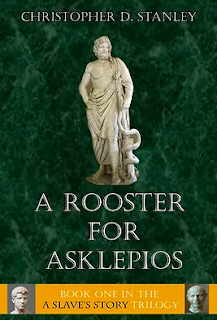
Excerpt
One day in March, when the winter snows had melted and the trees and fields were showing their first touches of green, a new face appeared among the horde of clients who visited Lucius’s house every morning to pay their compliments and request his assistance. Marcus was unaware of the man’s arrival, since he was seated at his small desk in Lucius’s office taking notes of his conversations and recording the various commitments that Lucius made to his clients and vice versa. It was the job of Hermas, the butler, to prioritize the mob that milled about in the atrium, not his. But when a new visitor entered and Hermas was unsure what to do with him—especially if he looked like he might be an aristocrat, or the agent of one—he often consulted with Marcus about how to handle him while Lucius was talking with one of his less important clients.
As he led the next visitor behind the wooden partition into Lucius’s office, Hermas signaled to Marcus to join him in the atrium. He pointed to a short man who was leaning with his eyes closed against one of the columns that ringed the shallow pool in the middle of the room. He was surrounded by a shaft of sunlight that was beaming through the opening in the roof, and he appeared to be enjoying the warmth. Hermas showed Marcus a small bag of coins that the man had given him to secure his attention. After a few moments of whispered consultation, Marcus nodded to the butler and walked over to the man.
“Greetings,” said Marcus. “I am Marcus, the personal secretary of Lucius Coelius Felix, the master of this house. I understand that you would like to see my master?”
The man wore the anxious but friendly face of a slave in his mid-thirties. He was attired in a spotless blue tunic and sturdy sandals and wore a gold ring on each hand. His dark, curly hair was neatly trimmed and his face freshly shaven, and Marcus’s nose caught a hint of perfume. This was no ordinary man’s servant.
“Greetings,” replied the man. “Actually, it’s you that I wanted to see. The butler tells me that you’re the one who arranges meetings with your master outside of his usual reception hours. My master would like to stop by and see him at a convenient time.”
“Who is your master?” asked Marcus warily. “I’ve not seen you here before.”
“Forgive me,” replied the slave. “I should have told you that from the start. My master is Gaius Curtius Theodorus, a visitor newly arrived in your city, and I am Fortunatus, one of the managers of his affairs. We’ve come here from Ephesus, where my master is a merchant and the owner of substantial property. He would like to extend his business to your city, and he sent me to arrange a meeting with your master the agoranomos to discuss how to manage such a move. He will pay you well for your assistance.”
He held out a small bag of coins, but Marcus did not immediately reach out to take it, so he tucked it back into his belt.
“What kind of business in your master in?” probed Marcus.
“He imports luxury goods—silks, spices, rare woods, that kind of thing,” said Fortunatus. “He’s going to need a local partner to help watch over his business in Antioch, and he thought that your master might be interested. He’s willing to offer generous terms to the right person,” he added with a wink. He held out the bag of coins again, and this time Marcus took it.
Marcus stared at the man for a moment. This was the first real business opportunity that had come to Lucius in his role as agoranomos, and he knew that he would want to hear about it.
“Wait here,” he said at last. “I’ll ask my master about it between clients.”
The man nodded and bowed slightly as Marcus turned to walk away. I could come to like this man, he thought.
Marcus spoke with the butler for a moment, then returned unobtrusively to the office and took up his usual station behind and to the side of Lucius. He knew this client, and after a few moments he could tell that he had not missed anything important.
“I think I understand your concern,” said Lucius, cutting the man off in mid-sentence. “I’ll have Marcus look into the matter for you. Now if you’ll excuse me…”
The man stood, bowed obsequiously, pronounced a blessing upon his patron, and left.
“What a bore,” said Lucius with a grimace. “But he has his uses. He wants to borrow yet more money from me to get a creditor off his back. Find out from Linus how much he owes and let me know by tomorrow morning. I’ll probably lend him what he wants, but I’d like to be sure where things stand first. I might have to cut him off if this keeps up.”
Marcus nodded. “So how do things look out there?” inquired Lucius. “Are there many more of them?”
“I’m afraid so,” answered Marcus. “But I’d like to speak with you for a moment before your next client, if I may.”
Marcus described his conversation with Fortunatus and handed Lucius the bag of coins that the slave had given him. Lucius hefted it for a moment, then returned it to Marcus.
“That does sound like an interesting proposition,” said Lucius when he was done. “If he is who he says he is—what was his name again?”
“I believe he said it was Gaius Curtius Theodorus, sir,” replied Marcus.
“Curtius,” echoed Lucius, wrinkling his brow. “I’ve never heard of anyone by that name here in Antioch. That’s too bad—it would be nice to know something about his family before I decide whether to see him. Of course, it’s possible that he’s a freedman; a lot of those merchants are.” He paused and stared at the wall for a long moment. Marcus waited.
“Yes, Theodorus could be a slave name,” he went on. “By Jupiter, I hope not; I don’t want to go into business with a freedman. Perhaps you or Linus could find out for me. Linus is good at digging up personal information on potential borrowers.”
Marcus nodded and scratched a note onto his wax tablet to talk with Linus about it.
“Still,” Lucius continued after another moment of reflection, “if this Curtius is wealthy enough to be trading in silks and spices, this could be a good chance to gain a foothold in a lucrative new business. I guess there’s no harm in talking with him. Go and tell his slave that his master can join me for dinner this evening. I don’t have any other commitments, do I?”
“No, sir, you’re free,” answered Marcus.
“Good,” replied Lucius. “I’d like to learn more about this man and what he has in mind. Tell Trophimus to get the house in order and arrange a good meal with the cooks. Nothing exquisite—we don’t know yet what kind of man we’re dealing with, and I don’t want to honor him above his station. But give him a decent meal nonetheless. You know what I mean.”
“Yes, sir,” replied Marcus. “I’ll take care of it.”
“And tell Hermas to hold my next visitor until I call him—I need to run to the toilet. That damned abdominal problem is giving me cramps again, and I need some relief.”
Marcus nodded and returned to the atrium, speaking first to the butler and then to Fortunatus.
“Very good—that’s good news indeed,” replied Fortunatus when Marcus told him of the dinner invitation. “My master did not expect such prompt accommodation, but I can assure you that he will be happy to accept this gracious offer. Can I tell him that your master found his proposition worthwhile?”
“He will listen to what your master has to say,” answered Marcus cautiously. To betray the extent of his master’s interest might weaken Lucius’s bargaining position.
“Then we will see you this evening,” replied Fortunatus with a genial smile.
“So you’ll be coming with him?” asked Marcus, surprised.
“Most certainly,” answered Fortunatus. “He doesn’t go anywhere without me.”
“Then I look forward to speaking with you further,” responded Marcus. “Farewell.”
“Farewell,” echoed Fortunatus, bowing slightly in the direction of Lucius’s office before turning and striding across the atrium.
Purchase LinksAmazon UK • Amazon US • Amazon CA • Amazon AU
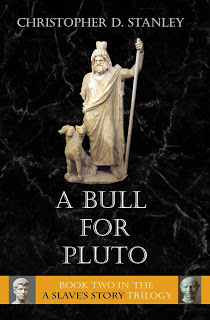
Praise for A Rooster for Asklepios and A Bull For Pluto
This compelling and enjoyable story offers the reader a superb 'insider' view of life in the first-century Greco-Roman world. I enjoyed traipsing around Anatolia with Lucius and Marcus!...Dr. Terence Donaldson, Academic Dean and Professor of New Testament, Wycliffe College, Canada
"The realism of this story reflects the author's deep first-hand knowledge of the landscape and culture where the narrative takes place."
...Dr. Mark Wilson, Director, Asia Minor Research Center, Antalya, Turkey
"This well-researched book really brings the Roman world to life!"
...Dr. Alanna Nobbs, Professor of Ancient History, Macquarie University, Australia
"The amount of research, imagination, and effort involved in crafting this story earned my admiration, and stirred my curiosity, too."
...Dr. Mark Nanos, Lecturer, University of Kansas, USA
About the Author

Christopher D. Stanley
Christopher D. Stanley is a professor at St. Bonaventure University who studies the social and religious history of the Greco-Roman world, with special attention to early Christianity and Judaism. He has written or edited six books and dozens of professional articles on the subject and presents papers regularly at conferences around the world. The trilogy A Slave’s Story, which grew out of his historical research on first-century Asia Minor, is his first work of fiction. He is currently working on an academic book that explores healing practices in the Greco-Roman world, a subject that plays a vital role in this series.
Connect with Christopher:
Website • Facebook • Twitter • Instagram • Goodreads
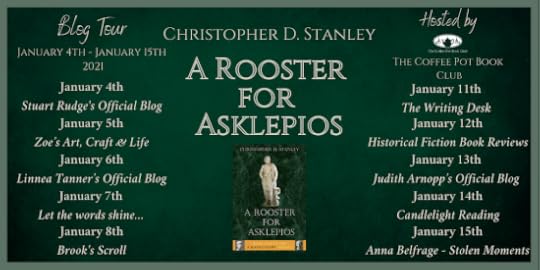
January 5, 2021
Book Spotlight and Excerpt: Discovery, The Orphan Train Saga, Book 1 by Sherry A. Burton
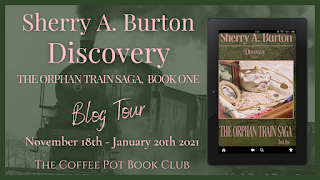
While most use their summer breaks for pleasure, third grade teacher Cindy Moore is using her summer vacation to tie up some loose ends concerning her grandmother’s estate. When Cindy enters the storage unit that holds her grandmother’s belongings, she is merely looking for items she can sell to recoup some of the rental fees she’s spent paying for the unit.
Instead, what she finds are secrets her grandmother has taken to the grave with her. The more Cindy uncovers, the more she wants to know. Why was her grandmother abandoned by her own mother? Why hadn’t she told Cindy she’d lived in an orphanage? And how come her grandmother never mentioned she’d made history as one of the children who rode the Orphan Trains?
Join Cindy as she uncovers her grandmother’s hidden past and discovers the life that stole her grandmother’s love.
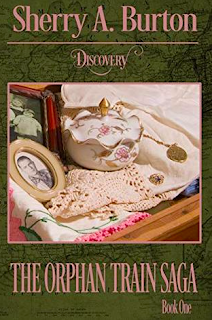
Excerpt
Helen motioned towards the doll. “I bought her last week when I learned the train would be coming. I hope you like her.”
Mileta felt another stab in the heart. It would only be a matter of time before they realized she was too big to play with dolls. “She is lovely.”
“You have had a long few days. I will draw you a bath, and you can soak in the tub.” Helen left the room, leaving the door open.
Mileta reached up and removed the bow from her hair and let her fingers glide through the length of her locks. She felt her lips quiver, took a deep breath, and went in search of Helen.
The washroom was two doors down the hall. Light blue tile ran through the room with a line of black separating the room midway across the wall. Helen sat on the edge of a large bathtub, her fingers floating under the water as it flowed from the spigot. She looked up when Mileta entered.
“The water is a little touchy. You have to keep a close eye on it, or it will get too hot and burn you. You can use the pink towel on the holder; it should be easy for you to remember, as it matches your room.”
Mileta nodded. It was the best she could do under the circumstances.
“There is soap in the dish. Make sure to wash your hair. Take your time and get clean. You can wear the same clothes for now. I am going to start supper. John will want to eat soon.” Helen turned the knobs to stop the water, then wiped her fingers with one of the other towels. She returned the towel to the hook, smoothing the creases.
The second Helen left the room, Mileta sank into the tub and burst into tears, all hopes she had of staying dashed.
***
“Mildred, you have barely touched your supper. Is it not to your liking?” John asked.
Mileta looked at the plate in front of her. A scoop of mashed potatoes smothered in brown gravy, glazed carrots, and a thin slice of perfectly cooked roast beef sat mostly untouched. She had not had such offerings since she’d left her home in Poland. That was the issue. If she were going back to the asylum, she’d rather not get used to such delicacies. “Oh, yes, sir, this is much to my liking.”
“Eat up, then. You will not get food like this tomorrow,” John encouraged.
Mileta felt the tears coming but could do nothing to stop them. As they spilled from her eyes, she sprang from her chair and raced to the room at the top of the stairs. She had her suitcase in her hand moments later when John and Helen entered the room.
Mileta pushed her chin out and swallowed hard. “I am ready to go back now.”
Helen waited in the doorway as John approached and sat on the edge of the bed. “What is this all about, Mildred? I thought you like it here.”
Mileta swallowed once more. “I do, but since you are going to send me back, I would much prefer to return today.”
John exchanged glances with Helen, who shrugged her confusion.
John addressed her once more. “What makes you think we are going to send you back?”
“Clearly, you were hoping to get a baby.”
“Why would you say that?” John asked.
Mileta nodded towards the doll.
John let out a breath. “It is just a doll, Mildred. All little girls like to play with dolls.”
Mileta stared at him.
“Have you never played with dolls, Mildred?” This time, it was Helen who spoke.
“Not that I can remember.” Mileta was surprised to see tears pool in Helen’s eyes. “Why does that make you sad, when you want me to go away?”
Helen dropped to her knees. “Mildred, what have I done to make you think I don’t want you?”
“You called him John instead of my father.”
“What?”
“When you picked me, you said you would teach me to cook. Then after you found I am a burden, you said you were going to cook supper by yourself, and you said John would want to eat.”
Helen smiled through her tears. “Oh, Mildred, this was all a misunderstanding. I called him John because that is what I am used to calling him. And I did not ask you to help me cook because I thought you would be too tired.”
“Then why did you not cut my hair?” Mileta asked through fresh tears.
Helen’s eyebrows knit together. “Why would I cut your beautiful hair?”
“Because that is what people do when you are going to stay. When my mother took me to the asylum that day, they made me take a bath. Before the bath, the woman cut my hair. Mary told me they always do that when you are going to stay.”
Helen wiped at her tears. “Mildred, I need to be honest with you. Remember I told you about the baby we had that died?”
Mileta nodded her head.
“Well, her name was Mildred. She would have been the same age as you. I like to think she would have even looked like you. That is why we picked you and gave you her name. We want you to stay with us and have the life our little girl never got to have. We want to give you the love we never got to give to her. Will you allow us to do that, Mileta?”
Mileta considered her words for a moment then shook her head. “On one condition.”
Helen looked at her expectantly.
“Will you call me Mildred again?”
Buy Links
Amazon UK • Amazon US • Barnes and Noble
About the Author

Sherry A. Burton
Born in Kentucky, Sherry got her start in writing by pledging to write a happy ending to a good friend who was going through some really tough times. The story surprised her by taking over and practically writing itself. What started off as a way to make her friend smile started her on a journey that would forever change her life. Sherry readily admits to hearing voices and is convinced that being married to her best friend for thirty-eight plus years goes a long way in helping her write happily-ever-afters. Sherry is the author of The Orphan Train Saga novels, a planned eighteen book historical fiction saga that revolves around the historic orphan trains. Books in the saga include Discovery, Shameless, Treachery and Guardian. Loyal, the fifth in the saga, expected to release summer of 2021. Sherry resides in Michigan and spends most of her time writing from her home office, traveling to book signing events, and giving lectures on the Orphan Trains.
Connect with Sherry
Website • Twitter • Facebook • Instagram • Pinterest • Goodreads

January 4, 2021
The inspiration behind Beneath Black Clouds and White by Virginia Crow

Despite adoring his family and enjoying frequenting gaming tables, Captain Josiah Tenterchilt’s true love is the British Army and he is committed to his duty. As such, he does not hesitate to answer the army’s call when King Louis XVI of France is executed.
Accompanied by his wife to Flanders, Josiah finds his path crosses with a man who could not be more different from him: an apprentice surgeon named Henry Fotherby. As these two men pursue their own actions, fate and the careful connivance of a mysterious individual will push them together for the rest of their lives.
But it is a tumultuous time, and the French revolutionaries are not the only ones who pose a threat. The two gentlemen must find their place in a world where the constraints of social class are inescapable, and ‘slavery or abolition’ are the words on everyone’s lips.
Beneath Black Clouds and White is the prequel to Day's Dying Glory, which was published by Crowvus in April 2017.
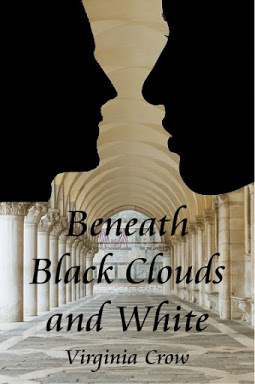
The inspiration behind Black Clouds and White
Virginia Crow
God and the Devil in the Deeds of a Surgeon
Beneath Black Clouds and White was the third book I wrote with the Tenterchilt family, so I’d already got to know them quite well. I had planned out every aspect of their lives from 1806-1855, spanning three generations. I had looked into the evolution of social constraints over that time, as well as the military advancements made (the Tenterchilts are a military family, with only occasional deviations from this rule).

But now it was time for something different. I was ready to go backward in time. And so I told the story of how the paths, which would later build this dynasty, first crossed. I don’t want to spoil the later stories for anyone who hasn’t read them, but the friendship between Josiah Tenterchilt and Henry Fotherby was one that would last them both for their whole lives.
The only problem was this:
When we meet Henry Fotherby in Day’s Dying Glory, he is a disillusioned former army surgeon, who is now a doctor. I knew he had an amazing backstory, but to tell it to its full worth, I had to really explore the world of military and civilian medicine and surgery during the 1790s.
I do almost all my research under the cautionary – and seemingly contradicting – phrases:
God is in the details
and
The devil is in the detail
I had flippantly remarked in Day’s Dying Glory that Fotherby had saved Major Tenterchilt’s leg and life after he was wounded several years ago. I’d been content to know that such things were reported to have happened, usually by the soldiers in question. But now I’d embarked upon this prequel, it was not enough to know that it happened, I needed to know howit happened.
During the second half of the eighteenth century, medicine and surgery were both beginning to make speedier advancements. But much of what was practiced could still be traced back to ancient techniques. As warfare had evolved, however, the surgery to deal with it evolved too.
So I delved into the world of medicine.
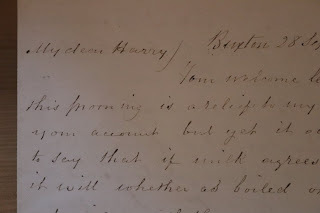
Buxton letter of thanks to a physician
One of the most fascinating things was how effectively primitive methods were used. Simple things, like using a cut onion to draw out toxin from a wound. Who comes up with that?
Also, and somewhat disturbing, was looking through the implements which were used in battlefield surgery. The lack of reliable anaesthetic was a big thing, and the accounts I read of both successful and fatal procedures, could have made much more comfortable reading with a dose or two of ketamine!
As it was, here is how events played out in the novel:
“This is your challenge, Fotherby. If you fail in this then the army will not have you back no matter how many exams you take.”
The weight of the man’s words fell heavily on his shoulders as Captain Peters thrust the scalpel towards him. He bit his lower lip thoughtfully as he accepted the instrument from his captain’s outstretched hand. Not daring to look at Kitson, he stepped over to the campaign desk and exchanged the scalpel for a thin pair of long-handled forceps and tried to stop his hands from shaking. He knew he was doing the right thing. Whatever Peters and Kitson thought, this was a new battlefield procedure, successfully practised during the American war.
Kitson stepped away from the table, his hands raised in a surrendering gesture, before he returned to tend some of the other wounded men. Peters nodded slowly towards Fotherby before he took Captain Tenterchilt’s shoulders and tried to hold him still, but he awoke and tried to free himself of the man who stood over him.
With a strength that surprised Fotherby, Peters pushed him back down with one hand and, snatching the leather strap of Captain Tenterchilt’s sword belt, he pushed it into the man’s mouth.
“Get on with it, Fotherby.”
Fotherby tried to ignore the twitches the man before him made. He applied a tourniquet and, pinning Captain Tenterchilt’s leg still beneath him, stretched the wound open far enough to allow the forceps into the man’s tissue. If he felt that at any point he was losing his control he considered all that weighed upon his success and, selfishly, he realised that it was not solely this man’s life, nor the happiness of his wife whose heartrending distress he had witnessed earlier, that was at stake. It was a proof that he could go on to achieve that goal he had dreamt of as a surgeon. As he delved further into the man’s leg, Captain Tenterchilt’s movements became more and more desperate, so that Fotherby almost lost control of the instrument in his hand, before at last he felt the ends of the forceps close about the shot. Pulling it back as gently as he could, he tried to steady his shaking hand. The ball slipped only once before Fotherby pulled it out from the captain’s leg. Captain Tenterchilt lay still, his eyes were closed and his body no longer tried to resist the crude surgery. For a moment Fotherby thought that he had died but, as he poured a sprinkling of wine into the man’s wound, the captain forced himself out of the hold that Peters had on him and tried to reach his leg. Fotherby stumbled away from such a gesture but Peters snatched the captain to him and, holding his arm about Captain Tenterchilt’s throat, spoke calmly to his apprentice.
“Are you to stitch the wound, Fotherby?”
Fotherby nodded quickly and tried to steady his nerves and his hands to thread the circular needle before he proceeded to apply surprisingly neat stitches to the wound. He felt quietly proud of himself as he stood back to admire his work. But as his gaze turned to the pained face of the man he had just operated on, spitting out the leather belt which was now peppered with tooth marks, he felt his resolve shatter and the needle slipped from his fingers as he fumbled with the knife to sever the thick thread.
Ultimately, it is this scene which sets up everything which follows in the book, and its sequels (of which there are three, but only one published so far!). It is this daring procedure which enables Fotherby to qualify and, when he is challenged on it by the Royal College of Surgeons, he responds:
“when the alternative is death it is a good time to put the case for living to the test.”
It was important to Fotherby’s character that he not only knew but also acted upon the latest medical advancements. This meant that I was flicking through some of the most obscure and – quite frankly – terrifying accounts of what the surgeon did to their fellow men in the hopes of bettering their lives. But Fotherby is an idealist throughout the books and, if he sees that something has worked, he is always eager to put it to the test.
After researching the surgery aspects of the medical history, next came the qualification side. This was much lighter reading, thank goodness! I found a couple of accounts from individuals who had partaken in the exams during the years around when Fotherby would have been there and placed my setting within their description. Writing it up was pretty fun, working within the confines of the accounts while putting Fotherby’s rose-tinted outlook on it all. Remembering that God and the devil were lurking in the finer details, I reviewed the policy of Surgeons’ Hall in regard to qualifications and had the grumpy clerk announce:
“Next exam is on 20th February then again on 6th March. First and third Thursdays each month. If you have a genuine interest in joining the Surgeons’ Hall you should have known that.”
But, not dissuaded for more than a short while, Fotherby qualifies. By the end of the book, he has undergone the complete transition from a young man with big dreams to a gentleman with enough qualifications to make him a doctor.
I like to think my foray into medical history provides an extra three-dimensional slant to the storytelling. It certainly sparked a fascination within me and, since writing Beneath Black Clouds and White, I’ve always been meticulous about the topic.
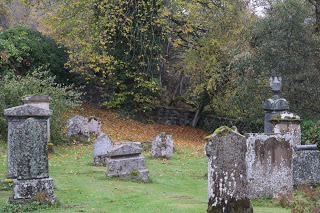
Kirkmichael Graveyard
At the moment, I’m writing a Middle-Grade novel set during the Black Death outbreak in Kirkmichael for a class at our local primary school. In many ways, it’s a gruelling topic to research – and trickier still to make it Middle Grade appropriate! – but I like to imagine Fotherby back then and how he might have responded to it. He would have made it all make sense and, via the details with God and the devil, I hope that’s what I managed to do, too.
Buy Links:
Amazon UK • Amazon US • Smashwords • Kobo • Barnes and Noble
¸.•*´¨)✯ ¸.•*¨) ✮ ( ¸.•´✶
About the Author

Virginia Crow
Virginia grew up in Orkney, using the breath-taking scenery to fuel her imagination and the writing fire within her. Her favourite genres to write are fantasy and historical fiction, sometimes mixing the two together such as her newly-published book "Caledon". She enjoys swashbuckling stories such as The Three Musketeers by Alexandre Dumas and is still waiting for a screen adaption that lives up to the book! When she's not writing, Virginia is usually to be found teaching music, and obtained her MLitt in "History of the Highlands and Islands" last year. She believes wholeheartedly in the power of music, especially as a tool of inspiration. She also helps out with the John O'Groats Book Festival which is celebrating its 3rd year this April. She now lives in the far-flung corner of Scotland, soaking in inspiration from the rugged cliffs and miles of sandy beaches. She loves cheese, music, and films, but hates mushrooms.
Connect with Virginia:
Website • Twitter • Facebook • Instagram • Publisher
Coming from Whispering Legends Press on February 14, 2021 - Forgiving Nero by Mary Ann Bernal - Kindle edition now available for pre-order
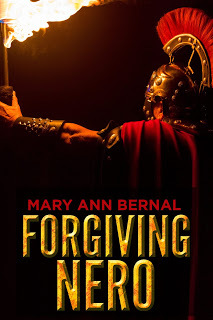
Rome. The jewel of the civilized world is no longer what it was. Strength has failed the Senate. Her legions are in disarray, and the Empire has fallen into Lucius Domitius Ahenobarbus Nero’s hands. His reign begins under a cloud of scrutiny, for he is the depraved Emperor Caligula’s nephew. Nero is determined to overcome that stigma and carve a name of his own. One worthy of Rome’s illustrious history.
Politics and treachery threaten to end Nero’s reign before it begins, forcing him to turn to unexpected sources for friendship and help. Many of the Praetorian Guard have watched over Nero since he was a small child, and it is in Traian that the young Emperor places his trust, despite the inherent threat of reducing his mother’s influence. Traian is the father he never had and the one man who does not judge him.
When Traian secretly marries the hostage Vena, it sets in motion a collision of values as Traian comes to odds with his former charge. The whirlwind that follows will shake the very foundations of the greatest Empire the world has ever known, and survival is far from guaranteed. Pre-order atAmazon US
Kindly visit Whispering Legends Press





